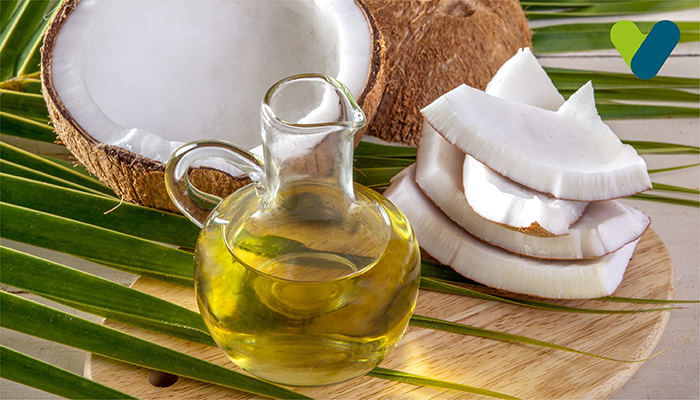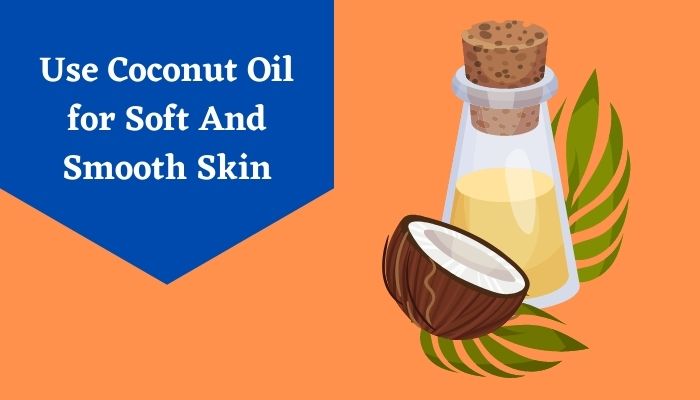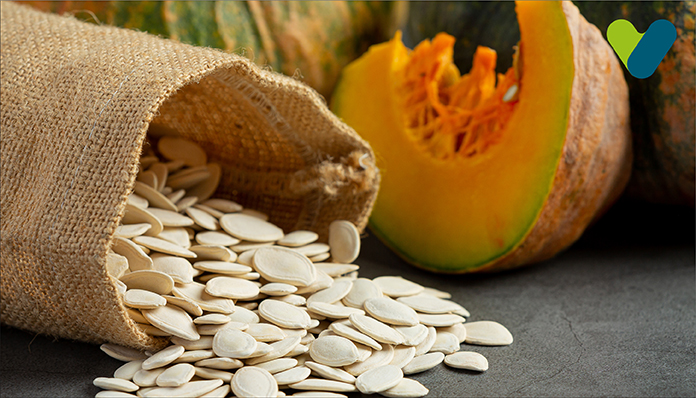Radhika (20-years-old) is a vivacious management college student from Pune. Over the past 3-4 months, Radhika has observed that her skin is dry, dull, and patchy. She even experienced some acne breakouts that not only tarnish her appearance but also her self-esteem. Radhika has tried many cosmetics and over-the-counter products to control acne and improve the appearance and elasticity of her skin. But she was not satisfied with the results. Then, one of her close friends recommended using coconut oil for her face and skin, as it will not only moisturize her skin but also will make her skin radiant and smooth. After applying coconut oil on her face for some time, Radhika noticed her acne was reduced and her skin looked fresh, soft, and glowing.
Let’s take a look at what this coconut oil is and how it is beneficial for your skin and face.
Composition Inside Coconut Oil
Coconut oil is highly saturated oil that is conventionally extracted from raw coconuts or dried coconut kernels. Coconut oil comes up with medium-chain fatty acids.These fatty acids are:
- Lauric acid: 49%
- Myristic acid: 18%
- Caprylic acid: 8%
- Palmitic acid: 8%
- Capric acid: 7%
- Oleic acid: 6%
- Linoleic acid: 2%
- Stearic acid: 2%
Types of Coconut Oil
The markets are flooded with two main types of coconut oils and they are virgin coconut oil and refined coconut oil. Virgin coconut oil is made from fresh coconuts and contains higher antioxidants and polyphenols. On the other hand, refined coconut oil is extracted from dried coconut meat. Refined oil needs to pass through various machinery processes to get the oil.Benefits of Coconut Oil on Face
Coconut oil is advantageous for your face and skin. Several studies suggest that it contains anti-inflammatory, antibacterial, and antiviral properties.1. Coconut oil kills microorganisms
You can use coconut oil on your face to avoid various infections like acne, cellulitis, and other skin infections like folliculitis, athlete’s foot, etc. All these infections are caused by bacteria or fungi. To prevent the growth of these microorganisms, you can apply coconut oil directly to your face and skin. Since coconut oil contains 50% lauric acid, hence it can fight microorganisms. As per the studies, lauric acid is the most effective in blocking the growth of bacteria. Another test-tube study claimed that lauric acid is responsible for killing Propionibacterium that develops inflammatory acne on your face. Coconut oil also contains capric acid that also has antimicrobial properties. Both lauric acid and capric acid can extirpate various strains of bacteria. Moreover, capric acid comes with antifungal properties, thus, it restricts the growth of certain types of fungi.
2. Coconut oil reduces inflammation on your face and skin
This is another major property of coconut oil. By using coconut oil on your face and skin, you can get rid of various skin disorders, including psoriasis, contact dermatitis, and eczema. Coconut oil reduces inflammation by improving its antioxidant status. Thus, coconut oil has huge potential in minimizing inflammation when you apply it directly to your face or consume it.
3. Coconut oil is useful in treating acne
Acne is a facial inflammatory condition where your skin gets inflamed, hardened, and creates pain (sometimes). Many medications are used in treating inflammation as well as acne. Since coconut oil reduces inflammation, hence it can be used to treat acne. Moreover, the anti-microbial properties of the medium-chain fatty acids in coconut oil reduce the size of acne. Several studies have proved that lauric acid in coconut oil kills bacteria that are responsible for acne. Apart from lauric acid, capric acid also contains anti-inflammatory and antibacterial properties.
4. Coconut oil moisturizes dry skin
Apart from treating acne and inflammation, you can apply coconut oil to your face to keep it hydrated. People who have mild to moderate dry skin can use coconut oil to treat parched skin. Several scientific studies have proved that coconut oil significantly improves hydration and is very effective in treating dry skin. Coconut oil is also useful in treating eczema, a skin condition developed by scaly and itchy rashes.
5. Coconut oil is effective in wound healing
If you apply coconut oil along with topical antibiotics on your face and other body parts, then it can heal burn wounds. Due to its antimicrobial properties, coconut oil can prevent infection also.
How to use coconut oil on your face?
- Coconut oil comes up with anti-microbial, anti-bacterial, and moisturizing properties, thus you can use it as a nighttime moisturizer on your face.
- Coconut oil is very useful in removing your eye make-up. It leaves the delicate area hydrated.
- You can use coconut oil as eye cream by putting it under your eyes to protect and moisturize the skin.
- Make a lip balm using coconut oil, cocoa butter, and beeswax and apply it to your lips to get rid of chapped and dry lips.
- Use virgin coconut oil for your face to highlight your cheeks. Just put a small amount of organic coconut oil over your make-up and leave it. This will highlight your cheekbones and will give you a shiny look.



